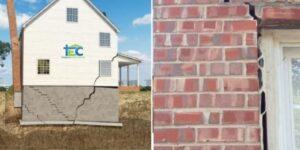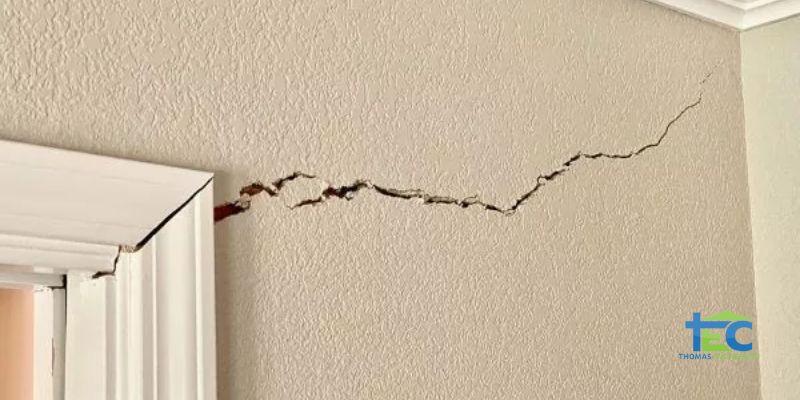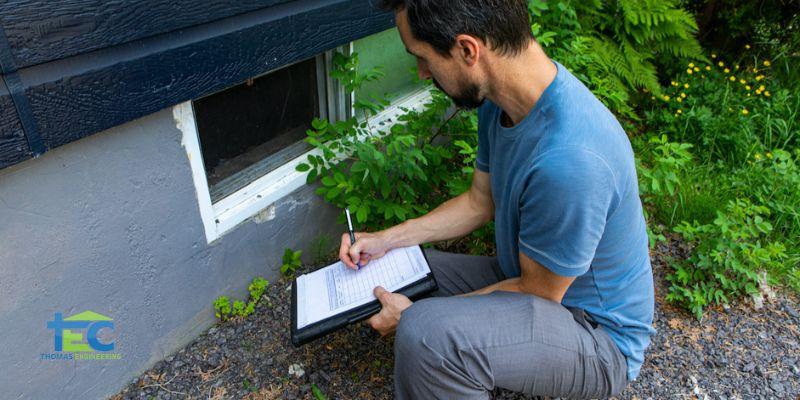
The foundation of a house is its most important component, supporting the entire structure. If damaged, it can lead to serious issues, such as cracked walls, uneven floors, and even structural collapse. Therefore, regular foundation inspections are crucial, especially in areas with challenging soil conditions like Texas.
The Texas Soil Problem
In Texas, the expansive clay soil is one of the leading causes of foundation problems. The high concentration of clay elements in this soil type indicates its ability to absorb water and expand when damp.
Clay minerals, on the other hand, contract when dried. This expansion and contraction cycle can strain a house’s foundation, causing settling, cracks, and other structural issues.
The impact of expansive clay soil on foundations can be severe. As the soil expands and contracts, it can pressure the foundation walls, causing them to crack. This can lead to water leaks, mold growth, and other problems.
In some cases, the pressure from the expanding soil can cause the foundation to settle, tilt the home, and damage the structural supports.
Foundation Inspection in Texas: What Homeowners Need to Know for Peace of Mind
As a homeowner in Texas, you need to ensure that your home’s foundation is in a good state. This is important, as it will give you peace of mind. Below are some things to pay attention to as a result:
1. Signs of foundation issues

It is essential to recognize the signs of foundation problems early on to avoid costly repairs and damage to your home. Some common indicators include cracks in the walls, both inside and out; uneven floors; sticking doors or windows; and gaps around window frames.
If left unattended, these issues can worsen, leading to more significant structural damage and a decrease in your home’s value. Regular visual inspections can help homeowners identify potential problems early on. This will give you peace of mind, knowing that your home’s foundation is in good condition.
2. Schedule regular foundation inspection
Homeowners can do a basic visual inspection of their foundation, but a professional inspection is necessary for a thorough assessment. This is especially important in Texas, where the soil type can make foundations more susceptible to damage.
Certified foundation inspectors have the training and equipment to identify subtle signs of foundation problems that homeowners may miss. They can also recommend preventive measures and any necessary repairs. Homeowners in Texas should schedule a foundation inspection before buying a home, after severe weather events, and if they see any signs of foundation damage.
3. Understand foundation types
Understanding the different types of foundations is essential for peace of mind in Texas. The two most common foundation types are slab, pier, and beam. Each type has its potential problems.
For example, slab foundations are prone to cracks and leaks, while pier and beam foundations can have problems with beams, piers, and crawl spaces.
Knowing these potential problems can help you prepare for foundation inspections and make informed decisions about your home.
4. Soil moisture management
Soil moisture management is essential in Texas due to the condition of the soil. The soil in Texas is often clay-rich, making it difficult to drain water properly. This can lead to soil erosion and foundation problems.
Installing a drainage system is one way to avoid extreme moisture fluctuations around the foundation. This will help divert water away from the foundation and prevent it from accumulating. It is also important to avoid overwatering plants near the foundation. By adequately managing soil moisture, you can prevent foundation problems and extend the life of your home.
5. Foundation maintenance

Maintaining your home’s foundation in Texas is essential to preventing costly repairs. Soil moisture issues are common in Texas and can cause the soil to expand and contract, putting stress on the foundation. This can lead to cracks, settlement, and other problems.
You can do a few things to maintain your foundation and prevent soil moisture issues. You can water your foundation regularly, especially during the dry summer, when the soil can shrink and cause cracks.
6. Document changes
Documenting your foundation condition is essential for maintaining the structural integrity of your home. By regularly inspecting your foundation and keeping track of any changes, you can identify and address potential problems early on before they cause major damage.
In addition to documenting any damage, it is also essential to keep track of the overall condition of your foundation. This includes noting any changes in the size, shape, or color of any cracks. Regular documentation can help you avoid costly repairs and significant damage to your home.
7. Foundation repair options
If you suspect that your home has foundation problems, it is essential to consult with a foundation repair specialist as soon as possible. These professionals can inspect your foundation and identify the cause of the problem. They can also recommend the best course of action for repair.
Getting multiple quotes from different foundation repair specialists before proceeding with repairs is essential. This will help you compare prices and services and choose a contractor you are comfortable with. It would help if you also asked for references from previous customers.
Conclusion
Foundation inspection is essential for homeowners in Texas due to unique soil challenges. Understanding the signs of foundation problems, scheduling regular inspections, and taking preventive measures can ensure home stability and longevity. Investing in foundation inspections protects your property and provides peace of mind.





